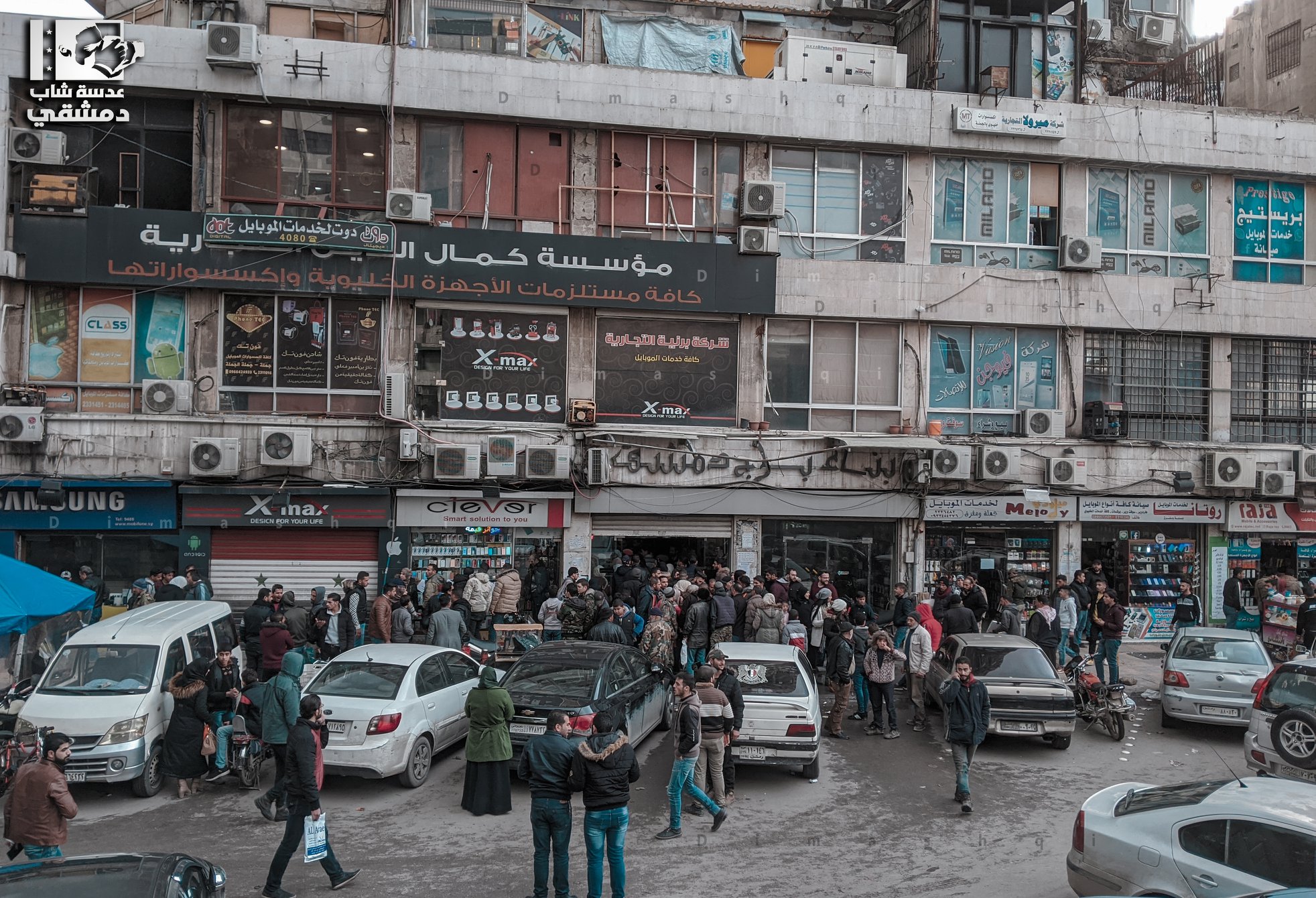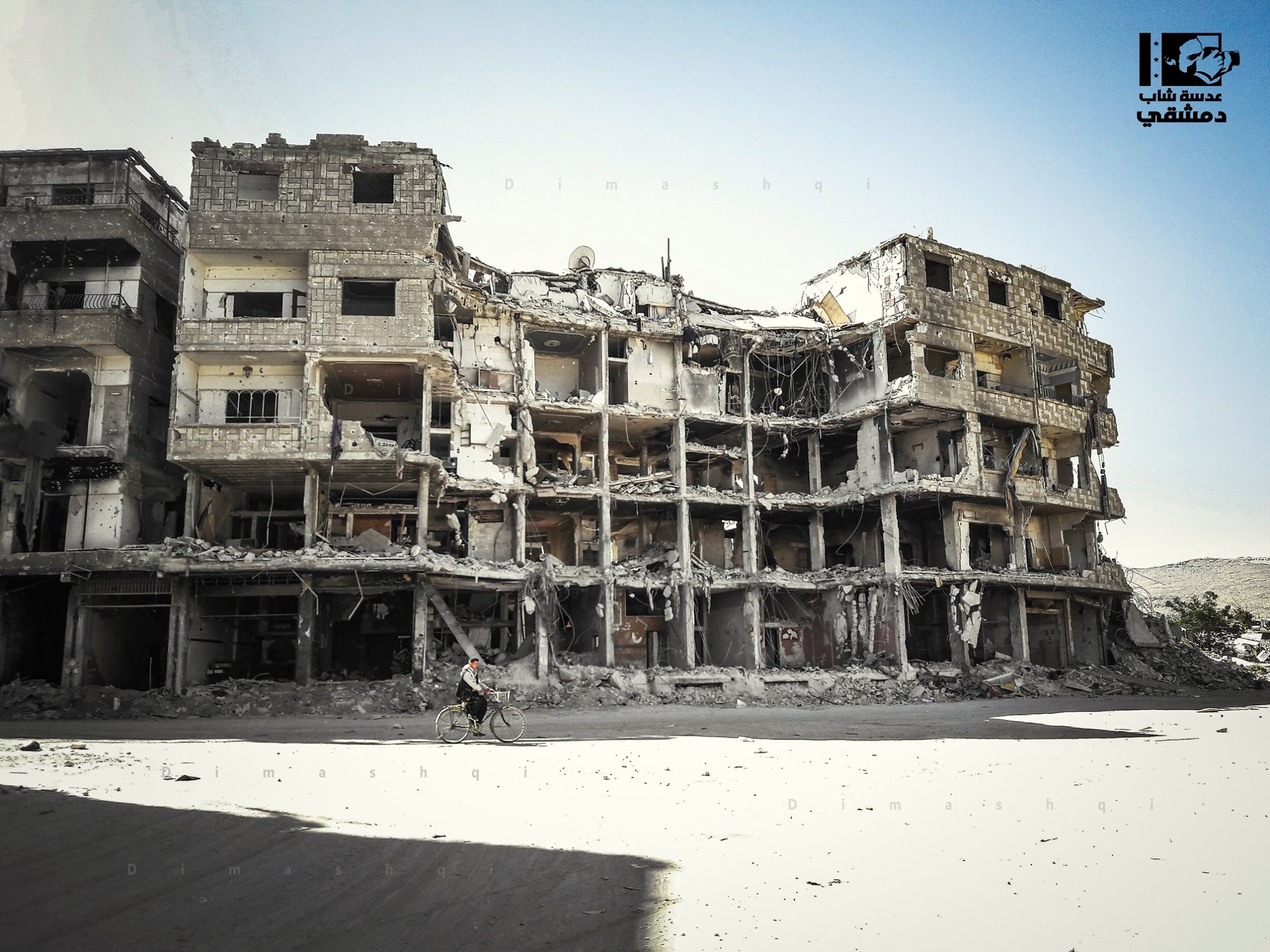“We deserve whatever happens to us. May God protect us from what lies ahead.”
With these words, the mayor of one small village just outside Qardaha, the hometown of late Syrian President Hafez al-Assad, addressed residents about the situation on Syria’s coast. Just four days earlier, on July 17, the US-enacted Caesar economic sanctions, a vast new package of measures promising to deal painful blows to whoever engages in business with the government, took effect.
A ‘missing piece’ in the debate: As Caesar sanctions go into effect, are ordinary Syrians protected?
18 June 2020
It has been perhaps decades since the last time voices rose up against the Assads in coastal Syria, the predominantly Alawite bastion of the country’s ruling family.
And yet, in the hours after the Caesar Act went into force, Qardaha found itself the inundated with government security patrols that had arrived early that morning. Their target: reports that residents had written slogans against the president across public walls and garbage bins.
Security patrols blocked the roads leading into neighborhoods where the graffiti had appeared, only to reopen them less than an hour later after they scrubbed away the writing.
There was no time for us take any photos to document the incident.
With the security personnel in town, most shops in Qardaha shut their doors, especially in the central market. Cafes and cell phone stores stayed only tentatively open. The price of the dollar, which had already been skyrocketing for weeks, meanwhile surpassed 3,200 Syrian liras—an unprecedented height. These developments had unfolded after the latest “battle,” during which “Rami was unlawfully and brazenly stripped of his money and companies,” as the village mayor said that day, referring to Rami Makhlouf, a business tycoon and cousin of Bashar al-Assad now caught in the midst of a bitter familial feud involving the former's web of companies.
The mayor’s stance in solidarity with Rami Makhlouf reflects the position of many residents of Qardaha. The fallout over Syrian first lady Asmaa al-Assad’s measures against Makhlouf’s al-Bustan Association further this solidarity. Government authorities seized the charity in 2019, and transferred its assets to Homs city, with Asmaa in direct management. Bustan had previously recruited unemployed local youth to the ranks of its military wing.
Market frenzy
For two months, the markets of the Syrian coast had been buzzing. But the Caesar Act quickly crippled and suffocated them. Despite most products on the market being local, residents were not spared the ensuing price hikes, with one kilogram of ground bulgur, a usually cheap grain, now costing 1,200 Syrian liras—half a dollar or more due to the price fluctuation.
“There is no state, and no control. Nobody cares. They are all feasting on us.”
Meanwhile, the price of one ton of livestock feed reached 1.2 million Syrian liras (more than $500), amid scarcity in the market, and certain manures essential for trees and vegetables vanished, after Russia seized Homs’ General Fertilizers Company.
A short walk through one market in Latakia showed the striking price difference between one shop and another next door.
Nawar*, who works at the local tobacco exchange, told a reporter of his recent grocery shopping trip. “An egg basket at the first shop [I came across] cost 2,300 Syrian liras, but at the second shop it was 2,500 and then 2,000 at the third shop,” he said. He ended up buying his eggs from the third shop.
“There is no state, and no control," he said of the fluctuating prices. "Nobody cares. They are all feasting on us.”
Syria’s coast had already been home to successive economic crises, even before the Caesar sanctions were put into force last month. Prices for bread and other food items had forced shops in Qardaha to shut down. Among them were local sandwich shops, where the price of one ball of falafel, a famously cheap snack, had reached 50 Syrian liras—the equivalent of about 10 cents before the currency freefall in recent months saw the lira enter a downward spiral.
Opposition: Caesar was not born overnight
The Caesar Act is not the only reason behind the economic collapse in the country, residents who spoke with SyriaUntold acknowledge. Jamal is a professor at Latakia’s Tishreen University who has long sympathized with the Syrian opposition. “We know that the Caesar Act has nothing to do with food supply and medication, theoretically speaking,” he told SyriaUntold recently, as the Caesar sanctions went into force.
“But, there is certainly a connection with the exchange price, which [last month] exceeded 3,000 Syrian liras to the dollar. A more than 100-percent rise in the price of medication followed, with the disappearance of 400 drug types from the market. Similarly, the price of food more than doubled. This is the reality of the situation, not mere speculation.”
Jamal fears the impacts on everyday Syrians like him could only worsen under the intensified economic sanctions. “The US imposed sanctions on Iraqis [in the 1990's]—later on, Saddam Hussein’s palaces, which Americans looted while invading Iraq, remained intact,” he said.
COVID-19 on the Syrian coast
28 March 2020
“Thousands of Iraqis died of hunger, but Hussein’s regime stood its ground. Then-US Secretary of State [Madeleine Albright] said it was ‘worth it.’ But we are afraid history might repeat itself here, and that we could suffer the same fate as Iraqis.”
Jamal isn’t alone. Youssef, a 45-year old man who lives along the Syrian coast, is a member of the opposition Syrian Democratic People’s Party. He worries about the long-term impacts that the Caesar sanctions could have on Syria’s economy, and that the act could “aim at preventing reconstruction and political transition.”
“[The Caesar Act] is a matter of regional and international balance, rather than one of meeting the demands of Syrians, who have lived through a terrible experience for 10 years. Their dilemma could have been avoided, had there been real international willingness to change the Syrian regime. But that did not and will not happen because of the Caesar Act.”
Pro-government loyalists: ‘We will not kneel’
The Baath Party branch in Tartous meanwhile staged a public demonstration in solidarity with the Syrian government against the Caesar Act, spurring mockery on social media—even from government supporters.
“This show of solidarity has raised the dollar price above 3,200 Syrian liras. Very impressive indeed!” Ibrahim, who works at the Department of Water in Tartous, said after the demonstration with a bit of sarcasm.
“Typical, same old ways… Our manager came in personally to tell us that everybody had to be at the solidarity demonstration. Whoever didn’t show up would have to suffer the consequences. We had no other choice but to come in and dance along," Ibrahim said.
Local police in Tartous province reportedly forced cab drivers to transport city employees to the demonstration. Still, only a few thousand participants are said to have shown up. There were no government drones hovering above to film the masses, and an official media outlet merely shared photos from the demonstration.
“The US has been imposing sanctions on Syria since 1980,” the secretary of one Baath Party branch in Baniyas, a city near Tartous, said to SyriaUntold. “This is not new. We starved during the days of Hafez because of our national stances, and we will not relinquish our rights in the face of the oppressive enemy now. Those who are fine with this can stay, and those who don’t like it can take off.”
When asked what right he has to “kick people out of the country,” he said, “this is our country. We, and nobody else, decide its policies. We realize that Russians are different from Americans. Without them, we would have lost the country. It is due to our cooperation with Russians and Iranians that we overcame the blockade and the 1980's siege.”
“Our current situation is much better than the 1980's. We now have strong friends like China and Venezuela. We will not kneel, come hell or high water.”
‘Theft and corruption’
Let’s not get ahead of ourselves—the Caesar Act, according to many observers and Syrians themselves, will not change the policies of the Syrian regime. That is, unless it is coupled with international pressure on Russia to move towards a political solution involving all Syrians.
The new US sanctions, which expedited today’s economic collapse, did nothing benefit the government's attempt to stir up a sense of revived Syrian patriotism, amid divisions between Russian, Iranian, Turkish and American sponsors.
This is clear from the pressures on people now being coerced once again to attend solidarity demonstrations, in what one resident called yet another door for “theft and corruption.”
*SyriaUntold has changed the names of all residents quoted in this report, to protect their safety.








